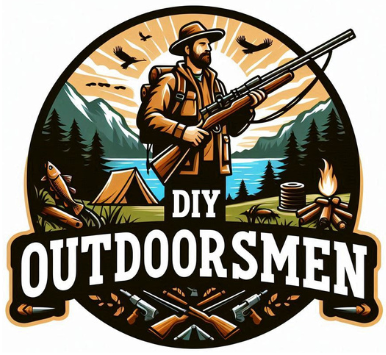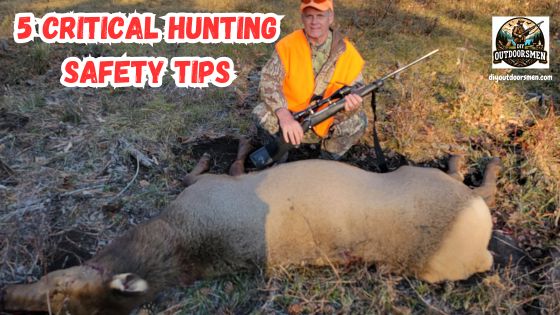Contents
Whether it’s your first hunt or you’re a seasoned pro, hunting safety should be your first consideration when planning a hunt. Start by giving your equipment a thorough once-over. Check that your firearms are clean, functional, sighted in, and that you follow proper firearm safety protocols at all times. Gear like scopes and binoculars should be in working order, and don’t forget spare batteries and tools for quick fixes in the field.
QUICK LOOK: 5 Important Hunt Safety Tips
- Getting to know the area can save you a lot of hassle and even help you score. Study maps, look for access points, and pinpoint good vantage spots and safe zones. Take note of any obstacles or landmarks. Scouting the area in person can also yield valuable intel you won’t get from just maps or apps.
- Weather can be a game-changer, so keep an eye on forecasts. Dressing in layers helps you stay ready for anything. Choose camo that blends with the terrain but also factor in comfort and utility. You don’t want boots that give you blisters or clothes that restrict your movement.
- Paperwork might seem like a drag, but it’s crucial. Make sure you’ve got the necessary permits and understand the local hunting laws. This not only keeps you legal but also supports wildlife management efforts. Ignoring these can lead to fines or worse, ruining your outing.
- Preparation isn’t just about gear and maps. Get your mind in the game too. Think about your strategy, plan your routes, and be clear about what you want from the hunt. Leave a detailed hunt plan with someone before you head out. The more prepared you are, the smoother and safer your experience will be.
- Firearms demand respect and strict safety protocols. Always treat every gun as if it’s loaded. Check it personally, don’t take anyone’s word for it, and make sure the safety is engaged until you’re ready to fire.
Firearm Safety Tips for Hunting Safety
Firearms demand respect and strict safety protocols. Always treat every gun as if it’s loaded. Check it personally, don’t take anyone’s word for it, and make sure the safety is engaged until you’re ready to fire. Hunting safety requires firearm safety.
Keep your finger off the trigger until you have your target in sight and are prepared to shoot. This simple step prevents countless accidents. Also, make sure you maintain proper muzzle control, pointing the barrel in a safe direction at all times.
Knowing your target and what lies beyond it isn’t just smart; it’s essential. A missed shot can travel far and strike unintended objects or people. Double-check your backstop to ensure it can stop bullets safely.
Firearms and ammunition need to be stored separately and securely when not in use. Lock them in a safe or use a cable lock and place ammo in a different location. This keeps firearms out of reach from unauthorized hands, including children.
Regular practice enhances not just your skill but your safety. Visit the range often to familiarize yourself with your firearm. Proper handling should become second nature, reducing the likelihood of mishaps during a hunt.
Hunting Safety Tips When Your in the Field
Before you head out, make sure someone knows where you’ll be and what your plans are. This helps if there’s an emergency and you need assistance. Communication can be a lifesaver.
- Visibility is key. Blaze orange clothing might seem like it clashes with your camo strategy, but it’s essential for letting other hunters know where you are. It helps prevent accidental shootings and keeps everyone in the loop.
- Being aware of your surroundings is crucial. Keep an eye out for other hunters, and always assume you aren’t alone. Moving cautiously and making your presence known can avoid dangerous encounters.
- A basic first-aid kit should be part of your gear. From minor scrapes to more serious injuries, having supplies on hand and knowing how to use them can make a world of difference.
- GPS and Communications: There are numerous GPS models specifically designed for hunters, as well as a variety of hunting apps to keep you from getting lost. Two-way radios or satellite communication devices give you the ability to call for help should the need arise.
- Hunting with a buddy adds an extra layer of safety. You can watch each other’s backs, help in emergencies, and make the experience more enjoyable. If you have to go it alone, check in regularly with someone back home.
Hunting Safety Emergency Preparedness Tips
Having the right gear can turn a potential disaster into a manageable situation. Pack essentials like a compass, water purification tablets, fire starters, emergency food supply, and a space blanket. These items take up minimal space but can be lifesavers if things go south.
Recognizing the signs of hypothermia and heat stroke can save lives. Know the symptoms and the basic steps to treat these conditions. If you or someone in your group starts showing signs, acting quickly is crucial.
Keeping a communication device, like a fully charged cell phone or a two-way radio, ensures you can call for help if needed. Extra batteries or a portable charger can also be invaluable in an emergency.
Learning basic navigation skills without relying on electronic devices is a smart move. Being able to read a map and use a compass can guide you back to safety if gadgets fail.
Knowing how to signal for help is also important. Carry a whistle, signal mirror, or even a bright-colored cloth to attract attention. These items can make it easier for rescuers to locate you. Emergency preparadness is a critical part of your overall hunting safety strategy.
Hunting Safety Tips Post-Hunt
After the thrill of the hunt, there are still important safety measures to follow for hunting safety.
- Start by unloading your firearm before transporting it anywhere. It’s a simple step but vital for preventing accidents.
- When dressing your game, cleanliness is key. Proper field dressing helps avoid contamination and ensures the meat remains safe to eat. Use clean, sharp tools and wear gloves if possible.
- Check yourself for ticks and other pests before heading home. These little guys can carry diseases, so give your body and gear a thorough inspection.
- Once you’ve got your game home, store the meat correctly. Use coolers and ice packs if you’re traveling a long distance, and refrigerate or freeze the meat as soon as you can to prevent spoilage.
- And, be sure to follow local regulations for reporting your harvest. This helps with wildlife management and keeps you compliant with the law. Plus, it’s a good way to contribute to conservation efforts.
As always, stay safe, enjoy the journey and please try to leave it cleaner than you found it. If you have any comments, questions, ideas, or suggestions please leave them in the comment section below and I’ll get back to you ASAP. You can follow us on YouTube: Man Art Creations for videos of our DIY Adventures.
Read Our Latest Hunting Articles
- Understanding Deer Behavior To Improve Your Hunt

- Complete Guide On Tracking Game Animals
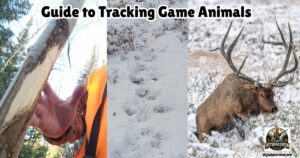
- DIY 4-Step Guide To Field Dressing And Quartering A Deer
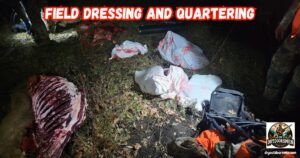
- Night Vision Binoculars For Nocturnal Hunting
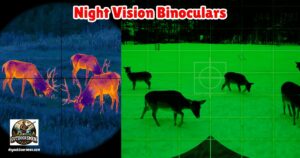
- The Science Behind Camouflage Patterns For Deer Hunting

- Binocular Accessories For Hunters

P.S. – Thanks so much for checking out our blog we really appreciate it. Just so you know, we may receive a commission if you click on some of the links that appear on our site. This helps us keep our content free and up-to-date for everyone. We appreciate your support!
